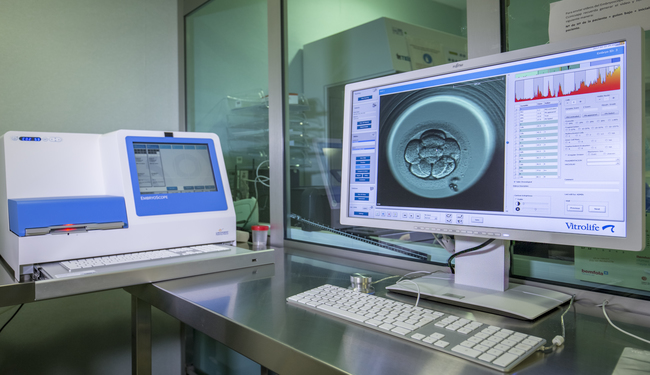Fertilisation failure: what might be the causes?

In vitro fertilisation treatment involves the extraction of eggs from the female’s ovaries so that they can be joined together with spermatozoids in the laboratory.
IVF treatment is normally recommended to patients who have already had unsuccessful outcomes following cycles of artificial insemination, possibly due to an unexplained cause of infertility or sterility, absent or injured fallopian tubes, endometriosis, low sperm count or poor sperm motility, ovulation and/or immune disorders, advanced maternal age or the need to perform a pre‑implantation genetic diagnosis (PGD).
There are two ways to inseminate eggs:
- Through traditional IVF. This method involves putting the prepared sperm sample in contact with the eggs and is used when no serious sperm issues exist; in other words, if the sample has a motile sperm count between 1 and 3 million spermatozoids/ml.
- Through sperm microinjection (ICSI). With this technique the spermatozoid is introduced into the cytoplasm of the mature egg. This method is utilised when there is a severe male factor such as serious abnormalities with sperm motility, concentration or morphology. Cases in which the sperm sample has not originated from the ejaculate, such as with sperm retrieved from a testicular biopsy, also require the use of ICSI; the same goes for cycles where previously frozen sperm or vitrified eggs are being used.
At any rate, there are many fertility clinics that prefer to inseminate eggs using the ICSI technique -even if the requirements for a cycle of traditional IVF are met-, to ensure a good fertilisation rate to the extent possible.
What is fertilisation failure?
The day after the eggs have been inseminated using traditional IVF or ICSI, we can determine the number of fertilised eggs, or pre-embryos, in the reproduction laboratory. The term fertilisation failure is used when none of the inseminated eggs have fertilised, or the fertilisation rate is very low.
This situation takes place in 11% to 15% of traditional IVF cycles, and in about 3% of ICSI cycles. As you can imagine, the consequences are generally very traumatic for the couple.
In cases of fertilisation failure, and before considering a new cycle of assisted reproduction treatment, a comprehensive analysis of the couple’s case must be carried out. This is the only way we’ll be able to arrive to valid conclusions and determine the next steps in order to reduce the likelihood, to the extent possible, that the same situation will happen again.
Fertilisation failure or poor fertilisation rates after IVF with traditional insemination
In cycles with fertilisation failure or poor fertilisation rates following traditional IVF, the recommendation is to carry out a new cycle and to use the ICSI technique to inseminate the eggs. This change normally causes fertilisation rates to improve considerably, though fertilisation failure can still occur in up to 3.6% of cases even when the ICSI technique is used.
It’s important to point out that several studies suggest that implantation and pregnancy rates are lower in patients who have experienced fertilisation failure in traditional IVF cycles. This may be due to the fact that there is a high likelihood that embryo development will be compromised during the ICSI cycle if the patients previously experienced fertilisation failure in their traditional IVF cycle.
We cannot stress enough that it is of the utmost importance to establish the cause of the couple’s infertility before carrying out a new treatment cycle using ICSI.
A sperm analysis with a normal result does not guarantee the absence of abnormalities in the chromosomal makeup of the sperm and/or germ line, as this occurs in up to 27% of patients with long-term infertility and repeated failed IVF cycles. In these cases, it is advisable to start performing more in-depth sperm studies such as sperm DNA fragmentation and sperm FISH, which are tests that analyse whether the chromosomes in the spermatozoids have a normal or abnormal makeup (what we refer to as abnormal FISH). It is also advisable to run meiosis studies on testicular tissue in these types of patients, as it has been shown that meiosis abnormalities in testicular tissue are related to repeated IVF failure, fertilisation failure and poor embryo quality.
Fertilisation failure after ICSI
When we are dealing with severe male factor infertility, fertilisation failure can occur following ICSI as a result of sperm quality. If we only find immotile spermatozoids in the sample to be used for sperm microinjection, it’s advisable to request a second sperm sample. If the second sample yields the same results as the first, a testicular biopsy should be suggested.
There is a great deal of controversy regarding cases of ICSI and severe teratozoospermia (i.e. defects in the shape of the spermatozoids). Recent publications have not found a relationship between sperm morphology (shape) and success rates. In patients with repeated fertilisation failure following ICSI, switching to donor sperm should be considered.
Fertilisation failure due to egg factor infertility
Fertilisation failure, in many cases, can also be attributed to poor egg quality due to advanced female age, unsuitable ovarian stimulation or because very few eggs were retrieved. In these cases it is advisable to carry out a new cycle of traditional insemination and, as a last resort, switch to donor eggs.
We also need to point out that approximately 2% of IVF cases in which the male has good sperm quality, a good number of eggs are retrieved following egg collection and the retrieved eggs are apparently good quality, result in fertilisation failure the day following insemination (meaning a high number of eggs did not fertilise or there was a total absence of fertilisation). In these cases we could suspect oocyte activation failure.
There are several causes that may lead to oocyte activation failure, though the exact reason cannot always be determined and, more importantly, cannot always be resolved. Sometimes the cause may be egg quality (morphological abnormalities), something that is closely related to the age of the patient, or it may be the result of the egg’s cytoplasm failing to completely mature or because the egg is unable to recognise the spermatozoid.
At present there are several techniques that can be applied to try to deal with the issue of oocyte activation failure. The most commonly utilised technique is oocyte activation using calcium ionophore; through this technique the eggs are put into contact with a calcium ionophore-rich medium which starts the chain of reactions needed for the egg to begin to fertilise correctly. The results of this technique, in some cases, may improve fertilisation rates with regard to previous cycles.

